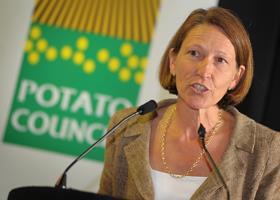
Two seasons of oversupply are causing 'great pain' for potato growers, according to Potato Council chair Fiona Fell.
Twelve months ago, Potato Council’s ‘Market Dynamics Report’ highlighted that 2013 year-on-year retail volume sales had fallen by 8 per cent - the equivalent of 133,000 fewer tonnes.
However, in 2014, just over 121,000 hectares were planted in again in Great Britain, a figure very similar to the year before.
“A favourable growing season in 2014 resulted in a 5.7m tonne crop, which was three per cent up on the previous season,” Fell added. “By November, the estimated GB stock position was the equivalent to two boxes per hectare (200,000 tonnes) higher than a year before.
'Great Britain can no longer utilise this level of production. The industry has been successful in reducing supply chain waste, and, coupled with a drop in fresh potato consumption, this results in a new base level for production, well below what we have been used to.”
The country's high stock levels have been placed under further pressure by a North-West European crop of 28 million tonnes, which is four milliion above the five-year average.
“The result is extremely uncomfortable and very challenging for our grower base,” Fell noted.
Ex-farm free-buy prices, both at home and abroad, have been weak too, reflecting the supply situation. The British weekly free-buy price fell to a new season low in the week ending 16 January, hitting £77.43/t compared to £152.09/t at the same point last season. This is the lowest it has reached since Autumn 2009, and the lowest for the time of year since the 2002/03 season.
Volatility is set to continue across agriculture and contracts are an important means of managing risk, Potato Council has stated.
As we head into the 2015/16 season, Fell stressed: “Grow what you are being asked to grow by the market. Grow what you know you can sell.”
Potato Council is the division of AHDB which works towards making the British potato industry more sustainable, competitive and profitable and helps stimulate use of the GB potato crop in home and export markets.



